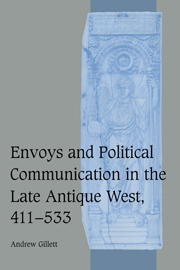Book contents
- Frontmatter
- Contents
- List of tables
- Preface
- List of abbreviations
- Chronological table
- Maps
- 1 EMBASSIES AND POLITICAL COMMUNICATION IN THE POST-IMPERIAL WEST
- 2 THE PROVINCIAL VIEW OF HYDATIUS
- 3 THE HERO AS ENVOY: SIDONIUS APOLLINARIS' PANEGYRIC ON AVITUS
- 4 THE SAINT AS ENVOY: FIFTH- AND SIXTH-CENTURY LATIN BISHOPS' LIVES
- 5 CASSIODORUS AND SENARIUS
- 6 NEGOTIUM AGENDUM
- CONCLUSION
- Appendix I Chronology of Constantius, Vita Germani
- Appendix II Chronology of the life of Epiphanius of Pavia
- Appendix III Senarius' Letters of Appointment: Cassiodorus, Variae IV, 3 and 4
- Appendix IV The text of Senarius' Epitaph
- Note on editions, commentaries, and translations of major sources
- Bibliography
- Index
- Cambridge Studies in Medieval Life and Thought Fourth series
1 - EMBASSIES AND POLITICAL COMMUNICATION IN THE POST-IMPERIAL WEST
Published online by Cambridge University Press: 12 July 2009
- Frontmatter
- Contents
- List of tables
- Preface
- List of abbreviations
- Chronological table
- Maps
- 1 EMBASSIES AND POLITICAL COMMUNICATION IN THE POST-IMPERIAL WEST
- 2 THE PROVINCIAL VIEW OF HYDATIUS
- 3 THE HERO AS ENVOY: SIDONIUS APOLLINARIS' PANEGYRIC ON AVITUS
- 4 THE SAINT AS ENVOY: FIFTH- AND SIXTH-CENTURY LATIN BISHOPS' LIVES
- 5 CASSIODORUS AND SENARIUS
- 6 NEGOTIUM AGENDUM
- CONCLUSION
- Appendix I Chronology of Constantius, Vita Germani
- Appendix II Chronology of the life of Epiphanius of Pavia
- Appendix III Senarius' Letters of Appointment: Cassiodorus, Variae IV, 3 and 4
- Appendix IV The text of Senarius' Epitaph
- Note on editions, commentaries, and translations of major sources
- Bibliography
- Index
- Cambridge Studies in Medieval Life and Thought Fourth series
Summary
INTRODUCTION
Embassies were ubiquitous, constant, and crucial during the break-up of the late Roman West and the establishment of the first medieval kingdoms in the fifth and early sixth centuries. The conduct of political communication through formal conventions was a shaping force in this period of change, more frequent if less obvious than warfare. This study examines the literary monuments for the envoys who carried out the task of communication. Their story brings to the fore new aspects of political processes in the late and post-imperial world. Late antique embassies present uninterrupted continuations of Greco-Roman public oratory and administration, functioning in new and complex circumstances. The patterns of communication traced by envoys reveal a wide range of participants in political affairs. Envoys had long been the voice of cities and provinces to imperial authorities; in late antiquity, municipal envoys spoke not only of taxation and civic honours, but also of war and peace. Envoys now became also, as one himself put it, the ‘voice of kings’: with the rise of a multiplicity of states, rulers required forms of representation not needed by emperors in earlier centuries. Many constituents of the western polities employed envoys as their instruments, participating in classical conventions of communication which remained common to all regions and all parts of society in the West, long past the fragmentation of political boundaries. Rewards accrued to those who successfully undertook embassies, either on palatine service or for local communities.
- Type
- Chapter
- Information
- Publisher: Cambridge University PressPrint publication year: 2003

